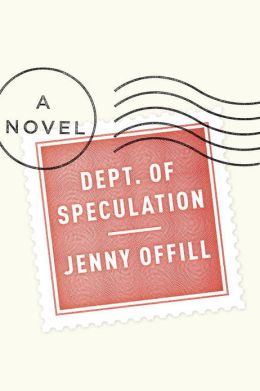Jenny Offill’s second novel, Dept. of Speculation, is staged with the brio of a one-woman show determined to keep its audience engaged and on edge. She succeeds. Both Offill and her unnamed narrator thrive on the strength of a belief that verbal dexterity is the most important resource in winning people over and achieving one’s goal. The narrator reflects on her seven-year-plus marriage – courtship, city apartment life, birth and growth of a daughter, marital tensions. The question is: why?
 For those to whom everything is apparent — and the narrator’s most attractive attribute is cerebral richness – there is no groping through language to get at the density of a disordered situation. An apt phrase or recalled proverb to gloss a memory is always reliably at hand. But why, “when I’m so weary of it all,” does she bother? Here, the gesture of speech is coterminous with motivation. Performance is its own reward.
For those to whom everything is apparent — and the narrator’s most attractive attribute is cerebral richness – there is no groping through language to get at the density of a disordered situation. An apt phrase or recalled proverb to gloss a memory is always reliably at hand. But why, “when I’m so weary of it all,” does she bother? Here, the gesture of speech is coterminous with motivation. Performance is its own reward.
The author’s and speaker’s wager is that the reader will feel privileged as the most intimate listener, since the narrator tolerates just one friend in her tale, a man called “the philosopher” whom she visits now and then for a chat. A best friend and a sister drop in and out. The husband, considerate but portrayed as rather bland, must lack an absorbency for her language. The child’s habits are generally displayed as contentious.
 As for the language, Offill sacrifices almost everything to and for attitude and tone. The prose is dispatched in punchy segments that follow one after another with a propulsive energy. A writer and teacher who owes her publisher another book, the narrator looks less to language as a distraction from dull, unyielding fact than as a means of achieving a stricken victory over those facts. It is a wordy vengeance on everyone including herself. She cites famous males — Hesiod, Coleridge, Keats, Fitzgerald, Eliot, Rilke, Berryman, Wittgenstein, Barthelme – as if there is a free-floating trace of after shave in her influences connoting the man who got away (she recalls an ex-boyfriend).
As for the language, Offill sacrifices almost everything to and for attitude and tone. The prose is dispatched in punchy segments that follow one after another with a propulsive energy. A writer and teacher who owes her publisher another book, the narrator looks less to language as a distraction from dull, unyielding fact than as a means of achieving a stricken victory over those facts. It is a wordy vengeance on everyone including herself. She cites famous males — Hesiod, Coleridge, Keats, Fitzgerald, Eliot, Rilke, Berryman, Wittgenstein, Barthelme – as if there is a free-floating trace of after shave in her influences connoting the man who got away (she recalls an ex-boyfriend).
At the outset, the narrative addresses the husband as a distant “you.” She remembers the days when the baby was new. “What did you do today, you’d say when you got home from work, and I’d try my best to craft an anecdote for you out of nothing.” Disillusionment is the keynote, a plaintive expressiveness. The language is so fluid and sharp that one tries not to feel that Offill is playing to the “why can’t a woman have it all?” caucus and is simply supplying a spiel that satisfies a meme in advance of the writing.
But what saves Dept of Speculation time and again is its truly grim passages, the ones that deserve a more primitive acknowledgment:
We applied our muzzy intellects to a theory of light. That all are born radiating light but that this light is diminished slowly (if one was lucky) or abruptly (if one was not). The most charismatic people – the poets, the mystics, the explorers – were that way because they had somehow managed to But the shocking things, the unbearable thing it seemed, was that the natural order was for this light to vanish. It hung on sometimes through the twenties, a glint here or there in the thirties, and then almost always the eyes went dark.
Dept of Speculation is a moving chronicle of disaffection, the mother ill at ease with the current behaviors of motherhood: “There are always other mothers at the school. Some of them arrive early, and because of this it is the same ones who notice every day if I am late. These are the same mothers, the early ones, who are also good at remembering what to bring on a given day. You might have to bring a picture of your child and her father, or suntan lotion, or an empty egg carton which is to be transformed into something. Because there are mothers like me who are sometimes late to school, the teachers have built a grace period into each day.”
The narrator’s speech builds tensely into an appeal to be regarded as something and someone other. If there is an unclosable gap of sensibility between wife and husband, Offill allows it to exist as an embedded phenomenon, an ancient fact. The narrator grieves, “There is still such crookedness in my heart. I had thought loving two people so much would straighten it.” It’s this crookedness, the sense that one must observe and perhaps is the cause of what goes awry, that resonates with and implicates the reader. This is the famous hysteria that got Freud’s couch chugging down the track – and now must be reheard and respected:
Stop writing I love you, said the note my daughter wrote over the one I left in her lunchbox. For a long time, she had asked for a note like that every day, but now a week after turning six, she puts a stop to it. I feel odd, strangely light-headed when I read the note. It is a feeling from long ago, the feeling of someone breaking up with me suddenly. My husband kisses me. “Don’t worry, love. Really, it’s nothing.”
 Offill shrewdly modulates the narrator’s notations to prevent the character from becoming a caricature of her own grimly acerbic making. In this way, the narrator may first observe of her fellow playground mothers, “The wives have requirements too, of course. What they require is this: unswerving obedience. Loyalty unto death” — and then, follow up in the next bit with “My husband sits in our kitchen and hand-sews a book. I hope that when it goes through the post office no machine will touch it.”
Offill shrewdly modulates the narrator’s notations to prevent the character from becoming a caricature of her own grimly acerbic making. In this way, the narrator may first observe of her fellow playground mothers, “The wives have requirements too, of course. What they require is this: unswerving obedience. Loyalty unto death” — and then, follow up in the next bit with “My husband sits in our kitchen and hand-sews a book. I hope that when it goes through the post office no machine will touch it.”
The novel produces a remarkable sensation of sharply perceived persons, situations and personal attributes canceling each other out. She notes, “What Kant said: What causes laughter is the sudden transformation of a tense expectation into nothing.” Dept. of Speculation seems to offer such expectation from the start – a sense that a hazy vector, not a smoke ring, points the way. If the story is told from a remove, in seclusion from its closest family and friends, it also makes remove its shaky solution: husband and wife preserve their marriage (such as it is) by leaving the site of their anxieties and breakages.
Towards the end of the book, the narrator visits the philosopher and tells him that even though her husband may leave her, “It was a fucking miracle that I found him … I think I was afraid to go all in … Because all in is terrifying. With all in, you lose everything.” Maneuvering between Nora Ephron-like zingers (she makes fun of yoga people) and more telling/less patronizing utterance, Offill doesn’t go all in either. Dept. of Speculation is just slick and trendy enough not to confuse the book clubbers – and sufficiently piquant for most everyone else.
Published by A.A. Knopf on January 28, 2014. 180 pages, $22.95 hardcover]